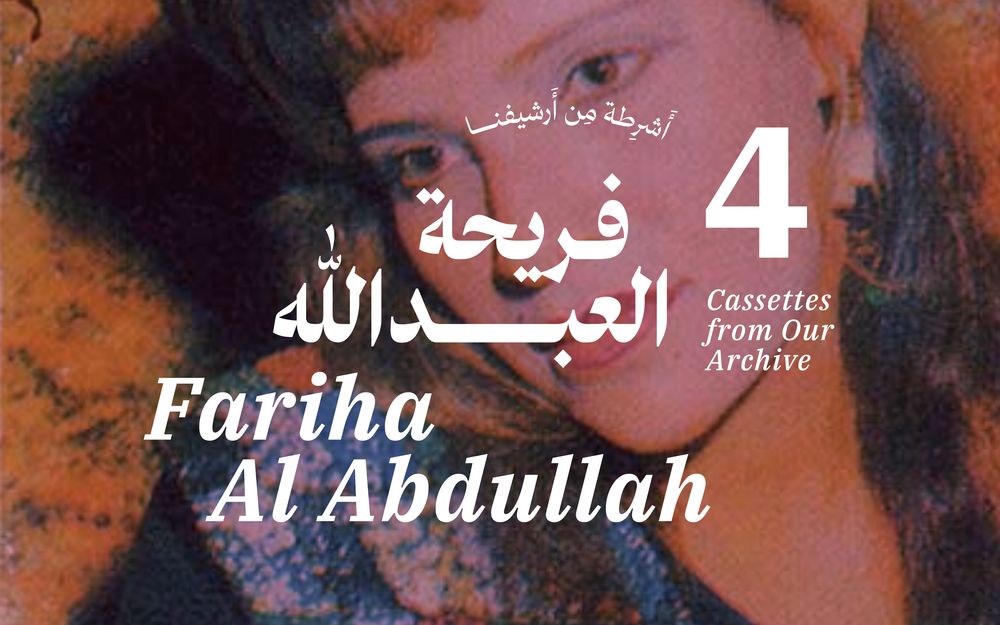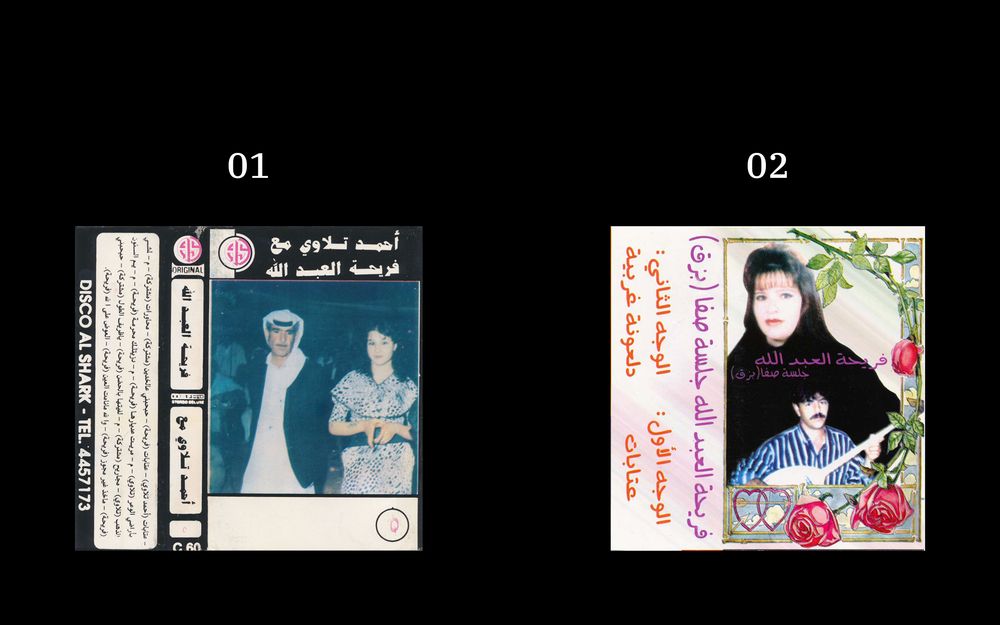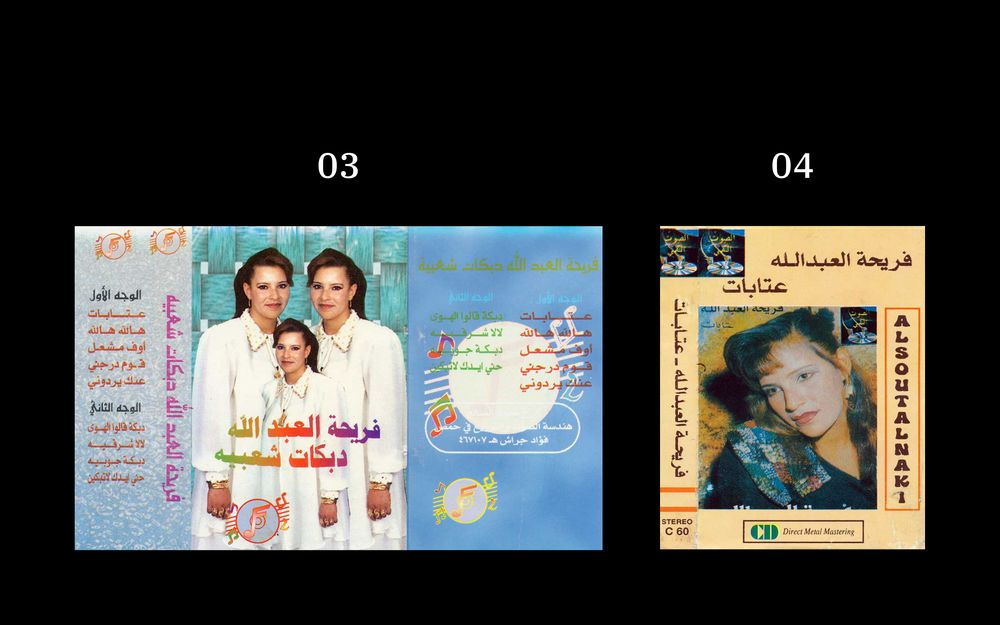


HIGHLIGHTS
Fariha Al Abdullah in Four Cassettes
Fariha Al Abdullah - Playlist
- Mijareeh (Wounded)
- Dalo’na
- Anak Yerddouni (They Forbade Me From You)
- Attaba
Before Saria Al Sawas became the first lady of Syrian shaabi song, the throne belonged to another mighty voice – that of Fariha Al Abdullah. Fariha is still present today, but she lived a golden age in the 1990s, when she was abundantly present at weddings, private parties, and nightclubs. She collaborated with a wide spectrum of voices and musicians, and shaped the features of the Syrian shaabi singer with her highly dynamic voice, adorned with a hoarseness that adds a layer of sadness. At the beginning of her career, Fariha carried the classification of Al Hajiat or Al Sheikhat, a title given by the people of Homs to female Syrian shaabi singers from their region who suffered rejection from their conservative societies. However, Fariha today carries another title, which she deservedly earned through her sprawling career: Singer of the Badia. Ahmad Tilawi and Fariha Al Abdullah – Ahmad Tilawi with Fariha Al Abdullah - Vol. 5 Ahmad Tilawi, one of the pioneers of Syrian shaabi music from Saraqib, was one of Fariha Al Abdullah’s early supporters. He performed alongside her in many concerts from the beginning of her career, when she was just eighteen. Tilawi played a crucial role in helping Fariha enter the shaabi scene by sharing the stage with her, and Fariha helped him by giving his performances a necessary dynamism that broke the monotony of the male voice, while complementing it at the same time. This cassette presents us with a 1990s wedding in Tal Bisa, Fariha Al-Abdullah's hometown in Homs Governorate, where Fariha and Tilawi performed a set of songs that reveal their exceptional harmony. When they sing duets like Mijareeh (Wounded) or Habhebni Al Khadden (Kiss Me on My Cheeks) together, the songs seem as if they were written specifically for them. Their solo performances also shine, with Fariha’s Dazzetillak Mahrama and Tilawi’s Yamm El Sunoun El Thahab complementing each other perfectly, demonstrating how their solo songs can be seen as two sides of the same coin. Fariha Al Abdullah and Najah Al Shaarani – Jalsat Safaa (Buzuq) - Serenity Session (Buzuq) On this cassette, we get a chance to listen to Fariha's tarab side within the Attaba and Mawal forms, accompanied by the skilled buzuq player Najah Al Shaarani, who, like Fariha, remains an active performer today in private parties. The cassette is characterized by a rough sound quality that makes Fariha sound like a singer from a bygone era, and gives Al Shaarani's buzuq a rich texture. Performing Dal'ona is considered a test that every Syrian shaabi singer must pass through, in an attempt to leave their mark on the famous classic. Fariha passes this test confidently on the second side of the cassette, tackling the song with a deliberate, immersive performance and a majestic voice, with which she engraves in our memory phrases like: He bought me, told me (for) the money / And I bought him, to flirt with his eyes / For Dal'ona. Fariha Al Abdullah – Shaabi Dabke Weddings were and still are the backbone of the Syrian shaabi scene, and the source of many of its recordings. On this cassette, we listen to a set performed by Fariha Al Abdullah, accompanied by a small band led by Mahmoud Al Saleh on keyboard and Nidal Hadid on oud, recorded at a wedding in the town of Deir Baalba in rural Homs. The cassette carries the echo of the wedding hall, which reverberates Fariha's unrestrained singing of dabke songs. Fariha shows her comfort with the keyboard as well as with traditional string arrangements, vigorously keeping up with its fast rhythms that tend to be colorful and boisterous, suitable for dabke, as in the song Hallah Hallah on the first side of the cassette. She opens the second side with a high-spirited performance of the song Lala, leading the band with enthusiasm and directing them with cheerful encouragements like "Play!" whenever she is delighted by their performance. Fariha Al Abdullah – Attaba This cassette, released by Sawt Al Naki records in Damascus, contains an hour of continuously flowing singing from Fariha. On the first side, she chose a colorful collection of rhythmic songs with fluctuating energy, during which she excels in the attaba form, combining the mastery of tarab with the lightness and abandon of shaabi music. The second side of the cassette differs noticeably, the dance energy decreases to make way for an extended attaba session, which ends abruptly on this recording. Here, Fariha relies on the strength of her voice to overpower the arrangement and captivate the listeners' ears.
Ammar Manla Hasan
Ammar Manla Hasan is a Syrian music journalist and researcher turned blockchain head. Co-founder of Taxir, and former Editor-in-Chief of Ma3azef.